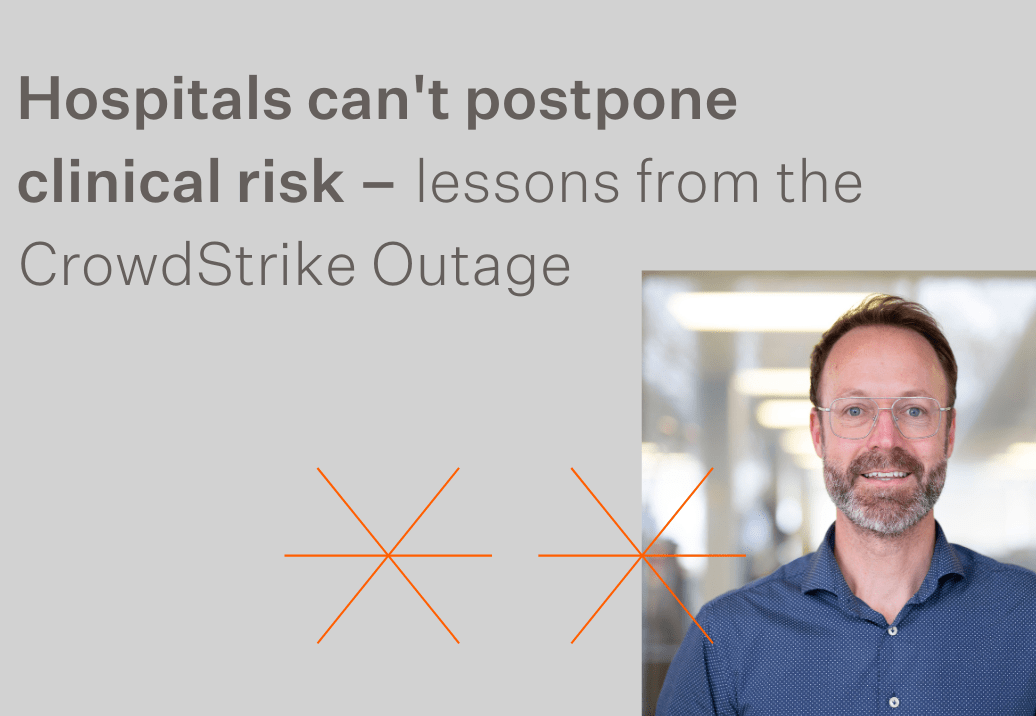Authored by Mark Hindle
Throughout my career in health technology, a few core principles have consistently guided me: prioritising joined–up data over system features and functions, focusing on the user and customer experience to remove friction, and always trying to find ways to empower the citizen, to help ordinary people like my family, friends, and community and me.
Several years ago, I read Dr Mohammed Al-Ubaydli’s book on empowering patients – it was a ‘lightbulb moment’ for me to understand the impact of owning a copy of your health record and how essential it is not just for empowering patients but also for ensuring the delivery of safe care. His belief that informed patients are better prepared to discuss their treatment plans, leading to more personalised and effective care, is something that continues to inspire me.
Getting the basics right: Empowering citizens through data access
When I was a Public Governor of my local NHS Trust, I would pop up at GP Patient Participation Groups and engagement forums and ask people what they wanted from the health system. The overriding feature of these conversations was always that people just wanted to be involved. The phrase “No decision about me without me” was introduced by the NHS in 2010 to emphasise patient-centred care, but as a system and as a country, we’ve struggled to really address this issue and ‘get the basics right’ of providing access to data to support patients and their ‘circle of care’ to be on the same page.
On the path of my career, I was fortunate enough to meet and then work with Dr Brian Fisher, a long-standing advocate for patient access to medical records since the 1980s. He believes that giving patients access to their health data is crucial for fostering a sense of ownership and responsibility over their healthcare and argues that when patients are informed and have access to their records, it leads to better engagement in their care, improves communication with healthcare providers, and can even reduce the need for appointments and phone calls, as patients can view their information directly.
His work, alongside others like Dr Amir Hannan, has demonstrated that providing record access can significantly reduce demand for consultations, as seen in their studies on online record access in GP practices. Dr Fisher stresses that the technology has been available for years, and now is the time to make patient record access a standard practice in healthcare to truly empower patients,
How can we unlock the NHS App’s potential even further?
In our work at Orion Health, I believe we are starting to respond to the challenge of this long-standing issue and find pragmatic solutions to help those tasked with caring for us to bring us into the loop and to provide a common foundation for a sense of responsibility that will help the prevention agenda that has become so time-critical for our citizens and our health system.
The NHS App now boasts over 34 million registered users in England and has proven its worth since its launch in 2019, particularly during the pandemic. It provides access to a wide range of NHS services, from ordering repeat prescriptions to viewing GP health records and NHS-verified health advice. While its existing functionality is undoubtedly valuable, there is an opportunity to push its potential even further.
A recent post from the Tony Blair Institute for Global Change on the NHS’s data landscape provided some food for thought on how to more efficiently get patient data from across the system into patients’ hands. There’s currently not enough data available to patients within the NHS App, but things can change quickly.
Bridging the gap: Integrating shared care records with the NHS App
At Orion Health, we are starting to unleash the potential of our existing technology by joining up the dots between the NHS app as a digital front door, and the rich data set of shared care records, which we have been working with for over ten years. By working with NHS England to take the NHS App to the next level, we are developing a first-of-its-kind link to shared care record data accessible within the app.
Our solution, Virtuoso Connect, is an API gateway that enables the integration of comprehensive data from any shared care record into the hands of the patient using the NHS App. It is connected at the Integrated Care System level, meaning that data can be shared from multiple trusts, organisations, and contributors with one connection across a geography.
Like those that have advocated for progress in this area before us, our aim is to empower citizens with access to shared care record data, giving them a more comprehensive view of their health and care data, and one place to view all their interactions with the health system.
Empowering patients to take control of their health
When patients have access to the same information their doctors see, they can make better decisions about their health. Whether it’s managing a condition like diabetes or Parkinson’s, having all the facts in one place means you can have more meaningful conversations with your doctor and avoid unnecessary treatments.
The first shared care record data to be integrated into the NHS App will be outpatient appointment information. This will allow citizens to see all upcoming appointments across their health system and cancel and rebook appointments from a single location. This crucial development opens the door for exciting further enhancements. By continuously integrating new shared care record data sets as they become available via the NHS Wayfinder, the NHS App will provide citizens with even more comprehensive health information, empowering them to take an active role in their healthcare.
Driving better interactions with the NHS App
Making more data available will also be vital to driving more interaction with the NHS App itself— and not just more interaction but better interactions. Access to the same health information as their care teams allows patients to have more informed conversations, potentially reducing unnecessary tests and procedures. This will enable people to be better equipped to choose the right services, avoiding defaults to A&E.
The more data available to citizens through the NHS App, the more they gain greater control over their health, encouraging self-management and adherence to treatment plans. Increasing patient engagement in this way significantly reduces the demand for resources, shortens waiting lists, and leads to better diagnoses and treatments.
The NHS App is already revolutionising patient engagement in England, and the prospect of unlocking even more potential by integrating shared care record data to help address the significant challenges facing our health system is exciting. Orion Health is proud to be at the forefront of this transformative journey and committed to leveraging our extensive integration experience to help create a more sustainable future for the NHS and its patients.
A global perspective: Lessons from Saudi Arabia’s NEOM initiative
In my work around the region, I am fortunate to work in the Kingdom of Saudi Arabia as they look to reimagine traditional ways of thinking about health and wellness and healthy communities. In NEOM, they are pioneering a radical shift in healthcare by focusing on health coaches and digital-first solutions rather than traditional primary care models. Their vision centres on proactive health management, empowering individuals to take charge of their wellness outside of hospital settings by giving them a digital health coach, and access to a physical one, who is assigned to them from birth. I wonder if they are the next pioneers, proving that true, data-driven prevention is possible from the foundations of patient access, empowerment and engagement.
Moving forward: The future of healthcare empowerment
It will be fascinating to observe the impact of integrating shared care records with the NHS App for both individuals and the broader healthcare system. For patients, having their complete medical history, including records from GPs, hospitals, and other providers, accessible in one app will empower them to actively manage their health, make informed decisions, and engage more meaningfully in their care.
This enhanced visibility could reduce the need for unnecessary appointments, streamline communication with healthcare providers, and improve health outcomes. For the health system, integrating shared care records is expected to reduce administrative burdens, prevent duplicated tests or treatments, and facilitate smoother transitions between different care settings. This approach can ultimately lead to cost savings, a reduction in missed appointments, and a more efficient healthcare delivery model.
As we move forward, we must also ensure that no one is left behind as healthcare increasingly shifts to digital-first solutions. Without thoughtful strategies to support digital literacy and provide alternative options for those who need them, there is a risk of deepening health inequalities. It’s crucial to ensure that digital tools complement, rather than replace, existing care, ensuring equitable access for all.




